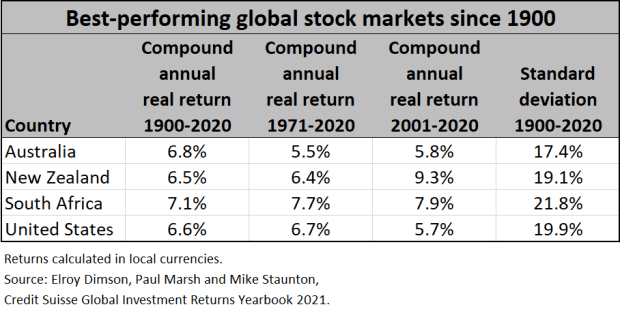If you want to own international stocks, invest in these 3 countries instead of China
This weekend, millions of viewers will watch one of America’s most famous entrepreneurs, Elon Musk, co-founder and CEO of Tesla, host Saturday Night Live.
Meanwhile, China’s best-known entrepreneur, Jack Ma, co-founder of Alibaba Group, has appeared just once in public in the last five months after the all-powerful Chinese government launched a regulatory offensive against his financial services company Ant Group.
This, in a nutshell, tells you why the U.S., for all its problems, is a great place to invest, while China, for all its strengths, is a bad one: The U.S. encourages innovation while China crushes it.
This column has argued for years that investors should put most of their money into U.S. stocks and avoid emerging markets, of which Chinese stocks comprise roughly 40%. U.S. stocks have outperformed emerging and developed markets by a huge margin over the past 12 years and that’s likely to continue as we emerge economically strong from the COVID-19 pandemic.
And yet for years U.S. investors have pulled money out of superior U.S. stock funds while shoveling dollars into lagging international and emerging-markets funds. Last year alone, according to Morningstar, investors yanked $241.2 billion out of U.S. stock funds, nearly four times as much as they withdrew from international stock funds.
It’s OK to want some international diversification in your stock holdings, and if China and emerging markets won’t cut it and Europe and Japan are too stagnant, where should you look?
Three countries—Australia, New Zealand, and South Africa–have a very long track record of stock performance as good as or better than the U.S., with a similar risk profile. They each have dedicated ETFs you can buy as well, although with annual management fees north of 0.5% they’re more expensive than, say, the U.S.-focused Vanguard Total Market Index ETF VTI,
Three of the world’s leading scholars on asset-class returns have maintained a database on 32 different countries’ markets, some going back as far as 1900. Elroy Dimson, Paul Marsh, and Mike Staunton developed the database at the London Business School and update it each year for the Credit Suisse Global Investment Returns Yearbook. The table below shows their data on these three outstanding markets as of the end of 2020.

During the entire 121-year period from 1900 through 2020, South Africa has been the world’s leading stock market (in local currency terms), with a 7.1% compound annual return. Australia is runner-up, returning 6.8% per annum, while the U.S. finishes third, with a 6.6% yearly return, just edging out New Zealand’s 6.4%. And the performance of all three markets is consistent over the last 20 and 50 years, too, during which South Africa did particularly well, even as the country has been racked by political turbulence.
In a mineral-starved world, South Africa is a treasure trove—gold and diamonds, of course, but also manganese, platinum, coal and iron ore. Yet its market is well balanced between technology (30% of market capitalization), financials (28%) and basic materials (22%). While still an emerging market, South Africa’s risk level is in line with developed markets: Its standard deviation, a common measurement of volatility, is 21.8% over the whole 121-year period, just slightly higher than the U.S.’s 19.9%. The iShares MSCI South Africa ETF EZA,
Australia has long been known as “The Lucky Country” and until COVID hit it hadn’t experienced a recession in nearly 30 years. It avoided one during the financial crisis because of its trade with China, which accounts for 11% of Australia’s GDP (vs. roughly 4% for the U.S.)
It is among the world’s three largest exporters of iron ore, coal, zinc, gold, uranium and aluminum. Financials represent the largest component of the iShares MSCI Australia ETF EWA,
One big potential risk: rising trade tensions with China could hurt Australia’s economy, but this country’s century-long track record suggests it would find a way to cope with that, too.
New Zealand, another developed Asia Pacific island nation, is much smaller than Australia, but it has posted strong stock returns. The Heritage Foundation rates its economy the second-freest in the world (Australia ranks third), and it emerged almost unscathed from COVID. The iShares MSCI New Zealand ETF ENZL,
I could easily see getting your international equity exposure from these three countries, but you might also explore the Global X FTSE Nordic Region ETF GXF,
Howard Gold is a MarketWatch columnist. Follow him on Twitter @howardrgold1. The only security mentioned in this column that he owns is VTI.




